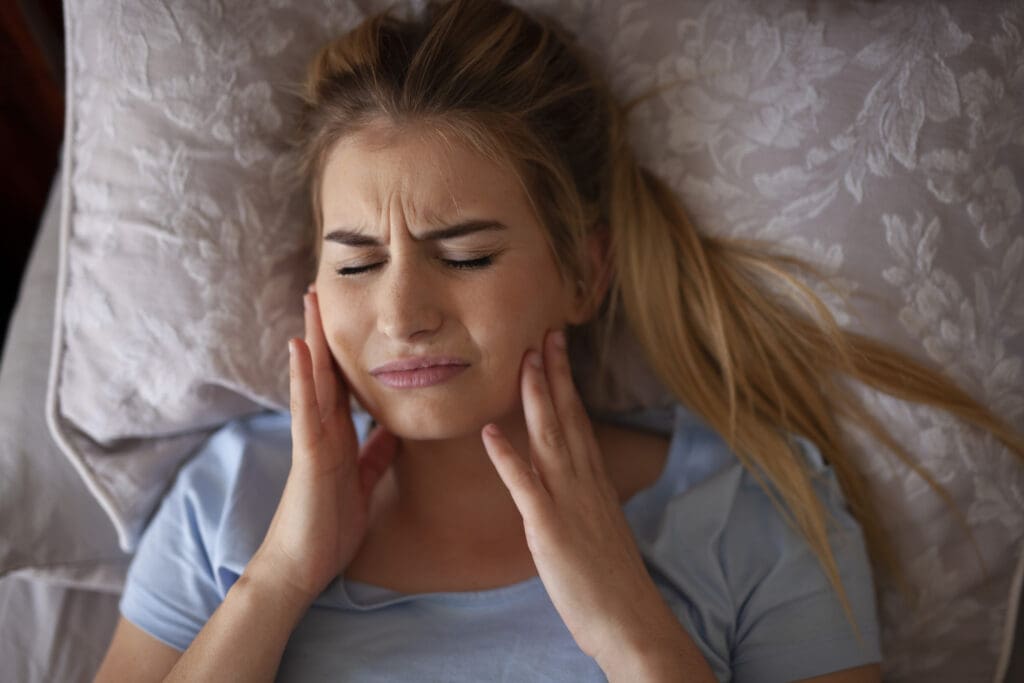Millions of people grind their teeth. Called bruxism, teeth grinding can lead to serious problems, including jaw disorders, headaches, and damaged teeth when left untreated.
Receiving dental services in Chester Springs, Pennsylvania, is easy and convenient when you visit Dr. Jason Petkevis. Dr. Petkevis is specially trained to treat patients with jaw and TMJ issues and other common dental concerns.

Identifying the Signs of Teeth Grinding
A qualified dentist best treats bruxism. Dr. Jason Petkevis has devoted much of his postgraduate training to the diagnosis and treatment of occlusal disorders, including teeth grinding and TMJ dysfunction.
Dr. Petkevis can easily diagnose teeth grinding through a comprehensive exam.
Signs and Symptoms of Teeth Grinding
- Worn, flat, or chipped teeth
- Abraded tooth enamel
- Sensitive teeth
- Jaw pain or tightness in the jaw muscles
- Earache
- Headache
- Facial pain
- Cuts or sores on the inside cheek
The TMJ, or the temporomandibular joint, connects the top and bottom jaws and causes the mouth to open and close. The term also describes jaw disorders that prevent the joint from functioning properly. When a patient has TMJ, it impacts the nerves in the face and neck, often resulting in frequent headaches, earaches, and neck and facial pain.
Treatment for Teeth Grinding in Chester Springs, PA
Stress is the primary cause of teeth grinding. Lifestyle changes and relaxation techniques may help to reduce or stop your teeth grinding. In many cases, though, professional treatment is needed to correct the source of the problem and repair damage caused by teeth grinding.
- Bite Guard—Dr. Petkevis frequently uses a teeth-grinding mouthguard or bite guard to stop teeth grinding. A bite guard is a customized, removable appliance similar to a sports mouthguard that is made to fit over your teeth and prevent teeth grinding. Most bite guards are worn at night; however, some patients wear their teeth-grinding mouthguards during high-stress situations such as driving.
- Bite Alignment Therapy—Dr. Petkevis is among the most experienced TMJ dentists in the Philadelphia area, providing a broad range of services to correct the causes of teeth grinding. One cause of teeth grinding is malocclusion, or improper tooth alignment. We can restore teeth to proper alignment using invisible braces, dental crowns, porcelain veneers, or dental implants.
- Cosmetic Dentistry to Repair Damage—Once the causes of teeth grinding have been successfully treated, the dentist will focus on repairing the damage caused by teeth grinding. Chronic teeth grinding can leave teeth worn, chipped, or broken. Dr. Petkevis may repair teeth using dental crowns, porcelain veneers, or cosmetic bonding.
Patient Review
Teeth Grinding FAQs
Should I visit the dentist if I grind my teeth?
Yes! A dentist can help you stop grinding and repair any damage it causes. If you notice pain in your jaw, mouth, or neck, you should schedule a visit with Dr. Petkevis. He can diagnose bruxism by visually examining a patient’s teeth. Dr. Petkevis has diagnosed many patients and helped them with their grinding using various dental treatments. A bite guard is the easiest and most convenient way to protect your teeth while you sleep.
Is teeth grinding linked to anything more serious?
Sleep apnea, a sleep disorder that causes a person to stop breathing periodically, may cause teeth grinding. When a person stops breathing, stress hormones may be released, causing them to tense up and grind their teeth together. Dr. Petkevis also treats sleep apnea. He offers custom-made night guards to help open the airway and eliminate sleep apnea symptoms.
How can you prevent tooth damage from teeth grinding?
Wearing a custom nightguard can prevent tooth wear, including chips and cracks. The nightguard provides a layer of acrylic between the upper and lower teeth. This hard material also prevents you from wanting to clench or grind your teeth unconsciously at night.
Can crooked teeth contribute to teeth grinding?
If you have an uneven bite due to crooked teeth, you may clench and grind your teeth. Biting and chewing with your uneven bite can pressure your teeth and jaw. This pressure can cause muscle spasms that can trigger tooth grinding while asleep. Sometimes, fixing crooked teeth can lessen instances of teeth grinding.
How can I relax my jaw to stop clenching my teeth?
Relaxation techniques, jaw relaxation exercises, and eating soft foods can help reduce jaw and teeth clenching. Reducing stress before sleep with aromatherapy, yoga, or calming music can help relax the upper body. One common jaw exercise is to place the tip of the tongue in the middle of the roof of the mouth. Slowly opening and closing the mouth can help relax the jaw muscles.
Eating softer foods can also relieve tension in the teeth and jaw. Avoiding hard or crunchy foods or cutting foods into more manageable pieces can relieve stress.
Schedule an Appointment to Stop Teeth Grinding
If you or someone you love suffers from teeth grinding, schedule a consultation with Chester Springs dentist Dr. Jason Petkevis. A simple bite analysis and consultation can reveal whether or not your teeth grinding is caused by TMJ dysfunction, and you can be well on your way to much-needed relief.
Call 610–400–1459 or Schedule an appointment to treat teeth grinding.
